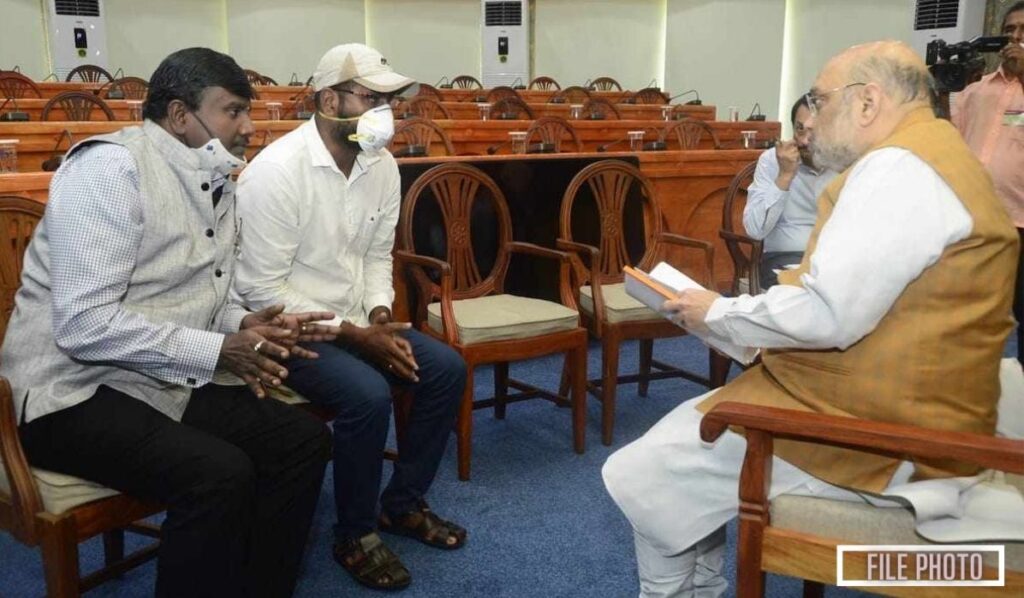Tarun Karthick
Campbell Bay, 8 May 2022
The Indian Origin – Sri Lankan Tamil Settlers of Katchal Island have been demanding resettlement to a non-tribal area from a long time. These settlers were settled at Katchal in the 1970s and were given jobs in the rubber plantation.
These settlers had launched a protest to press for their resettlement on 18th November 2020. They withdrew their protest after 134 days on 31st March 2021 after a meeting with the officials of the Andaman and Nicobar Administration. The decision for calling off the protest was taken after discussing the issue with Mr. Ajoy Bairagi, State President, Bharatiya Janata Party, Andaman and Nicobar Islands. Mr. Ajoy Bairagi had then assured that both A & N Administration and the Central Govt. are seriously trying to find a solution to the problems of these settlers and had asked them to withdraw their protest.
Nothing concrete has been decided regarding the resettlement of these settlers to a non-tribal area yet.
The members of the Katchal Settler community have once again requested the A & N Administration to expedite their resettlement to a non-tribal area.
The story of these settlers is quite interesting and painful. These settlers were settled in the Katchal Island in the 1970s to work in the Rubber Plantation which was originally raised by the Rubber Board for Govt. of India and later the management was entrusted to the Andaman and Nicobar Island Forest Plantation Development Corporation Ltd. These Sri Lankan Tamil Settlers were brought to India under the Sirima-Shastri Pact or Srimavo-Shastri Pact of 1964 wherein about 2,80,000 people of Indian Origin were brought back to India from Sri Lanka because of the protests of the locals against increasing Indian Tamil Population there.
45+ families of these Sri Lankan Tamil Settlers were settled in Katchal Island to work in the Rubber Plantation. The Andaman and Nicobar Islands (Protection of Aboriginal Tribes) Regulation, 1956 came into force on the 1st of July 1956, years before these settlers were settled in Katchal Island. Each family was provided with 0.5 Hectares of Land for Kitchen Garden without any license. The area where these Sri Lankan Tamil Settlers were settled was also not de-notified from the areas covered under the ANPAT Regulation, 1956.
Soon the population of these settlers started growing and they started looking for better opportunities to earn their livelihood, but the ANPAT Regulation, 1956 always prevented them from doing so.
In the year 1995, the first agitation by these Sri Lankan Tamil Settlers for resettlement on some other Island was witnessed. The issue reached the Indian Parliament and then finally the Andaman and Nicobar Administration agreed on their resettlement. The first suggested place for resettlement was proposed in Campbell Bay in 1999 and later it was changed to Hut Bay and the resettlement plan kept getting delayed because of some or the other reason.
In 2003, the then Prime Minister of India, Mr. Atal Bihari Vajpayee, visited Andaman and Nicobar Islands and the problems of the Sri Lankan Tamil Settlers were raised before him in the IDA meeting. Mr. Vajpayee then directed the Andaman and Nicobar Administration to facilitate their resettlement with 1.5 Hectares of land.
It was decided to resettle these settlers at Shaitan Khari in South Andaman with 1.5 Hectares of land for each family, but the locals of the region were against the decision of the Administration to settle them there.
In the year 2004, Andaman and Nicobar Islands were hit by the Tsunami and the issues of these Sri Lankan Tamil Settlers and their resettlement plans once again came to a halt.
In 2010 these Sri Lankan Tamil Settlers approached the High Court for their resettlement and in 2012 the High Court directed the Administration to resettle them from Katchal Island.
Andaman and Nicobar Administration reportedly did not implement the orders of the High Court. The Sri Lankan Tamil Settlers then initiated Contempt of Court Proceedings against the Administration in 2013 and the High Court then once again directed the Andaman and Nicobar Administration to resettle them within six months.
After the Court Order, Andaman and Nicobar Administration then gave a proposal for resettlement of these Sri Lankan Settlers with 200 Sq.Mtrs of land, which was refused by the settlers. The Administration then agreed to then resettle each family with 1 Hectare of Land at Kadakachang in South Andaman.
The plan was never put into action. The settlers waited because of the 2019 General Elections and then the COVID-19 pandemic prevented them from taking any further action.
Their recent protest went on for 134 days and was called off on 31st March 2021 after a meeting with the officials of the Andaman and Nicobar Administration.
Today there are about 1000 individuals in the Sri Lankan Tamil Settler Community in Katchal Island, from 45+ families back in 1970, there are around 242 families in their community.
In recent years, these Sri Lankan Tamil settlers have been demanding immediate settlement in a non-tribal area on favourable terms. After the closure of the rubber plantation, the members of the settler community have no way to earn their livelihood at Katchal Island. These settler families are facing existential crises. The land they are living on also does not belong to them and further, they cannot even start a business legally at Katchal because of the restrictions under ANPAT Regulation, 1956.
A delegation of these settlers even met Mr. Amit Shah, Hon’ble Minister for Home Affairs, Govt. of India during his visit to Andaman and Nicobar Islands. They have been knocking on every door in hopes that their resettlement will be expedited.

